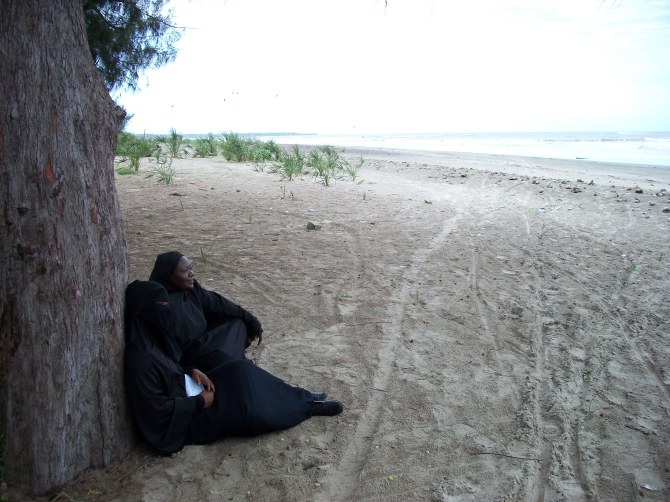 The scene is carpeted by a sprawling mass of sand, dappled with clusters of flax leaves that have been contorted by the unrelenting coastal gale. The sea is a streak of pale blue, barely-discernible from the sun-bleached horizon. In the forefront, two women, blanketed in black cloth, lean against the trunk of a thick tree. They could be mistaken for two schoolgirls catching their breath after a hot summer’s day.
The scene is carpeted by a sprawling mass of sand, dappled with clusters of flax leaves that have been contorted by the unrelenting coastal gale. The sea is a streak of pale blue, barely-discernible from the sun-bleached horizon. In the forefront, two women, blanketed in black cloth, lean against the trunk of a thick tree. They could be mistaken for two schoolgirls catching their breath after a hot summer’s day.
The women are named Rehema and Hadija, teachers in the Tanzanian coastal town of Pangani at Al-Hijdra School. Assigned with producing a photographic Alphabet Project under the theme of ‘Home’ (or ‘Nyumbani’ in Swahili), they combined this scene with the word ‘relax/rest (pumzika)’ to represent the eighteenth letter of their Alphabet.
During the planning stages of this project, I worked with the teachers to draft an alphabetic list of ‘home’-related vocabulary that would later be developed into a series of self-directed photographs. Skimming through these photos offers a memorable glimpse into the many facets of each woman’s persona. The adroitness with which Rehema commanded children in the street to feature in her photos reflected her authority as a teacher. The look of ritualistic contentment that settled upon Hadija’s face as she posed for ‘pika (to cook)’ enumerated her years as both a wife and a mother. The ease in which the women occupied thirty minutes of a shopkeeper’s time, asking him to position and prepare endless varieties of tea bags and fresh fruit for photographing, conveyed their reputation as respected members of the community.
As they led me up and down amber dirt paths and on and off their neighbours’ porches, I found myself brimming with questions that remained unanswered. Why did they choose to incorporate the word ‘sweep’ rather than ‘sleep’? Why would they choose ‘quarrel’ instead of ‘quiet’? I then realized that these differences echoed a myriad of contextual disparities between us, be it age, religion, culture, or ethnicity.
In merely an hour, Hadija and Rehema had unknowingly created a catalogued projection of their lives: the duties that were filtered down to them through generations of tradition, the pride that they take in serving their community, the unwavering sense of responsibility that they hold over their children, parents, spouses, and neighbours. In merely an hour, I learned more about them than I ever could have through observing them in a classroom for a week.
We occasionally meet teachers who struggle to see the value of activities like these, yet the task of externalizing your identity and persona into something tangible enough to be captured on film is no simple task. Rather, the LTP method demands critical reflection, the process is one of active revelation, and the product takes the form of an insightful visual representation.